Search News
For the Media
For media inquiries, call CWA Communications at 202-434-1168 or email comms@cwa-union.org. To read about CWA Members, Leadership or Industries, visit our About page.
CWA e-Newsletter: Dec. 12, 2013

December 12, 2013
Want to be in next week's CWA Newsletter? Send your stories and photos to blog@cwa-union.org or @CWANews. Follow the latest developments at www.resistancegrowing.org.
- Top Issues All Consumers Should Know
- Immigration Reform Advocates Take Over Congressional Offices
- TPP Trade Deal Misses 2013 Deadline, Talks Continue
- Tell the FCC: Keep Spectrum Auction Open to All
- Solidarity with Amazon Workers in the U.S. and Germany
- U.S. Senate Confirms Executive, Judicial Nominations
- T-Mobile Worker Survey Confirms Harassment, Bullying, Illegal Actions by Deutsche Telekom Subsidiary
- Bargaining Update
- NLRB Issues New Complaints Against NBC
- Building Our Movement
- CWA Heroes: Verizon Techs Stop Assault in Queens, NY
- December 10, 1948
- US Airways-American Airlines Merger Creates World's Largest Airline
Top Issues All Consumers Should Know
Richard Cordray, the first-ever director of the Consumer Financial Protection Bureau, an agency that's on the side of consumers when it comes to predatory lending and other bad practices by the big banks and other financial institutions, will join CWA President Larry Cohen on CWA's next Town Hall Call, Thursday, Dec. 19.
Cordray's nomination, like too many other executive nominations made by President Obama, had been blocked by the Republican minority, which tried to block creation of the consumer agency, but failed. Their next step was to try and stop Cordray's confirmation.
Cordray broke through the logjam last summer, when CWA and allies led a fight for confirmation of a fully-functioning, five-member NLRB, Cordray as CFPB director, Gina McCarthy as EPA administrator, and other nominations.
Register at http://cwa-union.org/cwacall.
Reminder: When you sign up for the remaining CWA town hall calls this year, you will be entered in a drawing for a personalized iPad Mini! The winner will be announced in the CWA News and e-newsletter.
Immigration Reform Advocates Take Over Congressional Offices
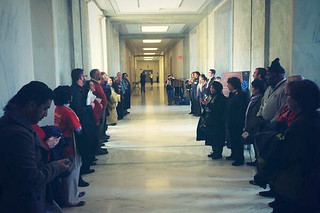
CWAers and allies sing “We Shall Overcome” in the Rayburn House Office Building halls.
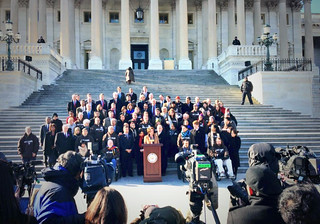
The Democratic caucus stands with Fast4Families activists.
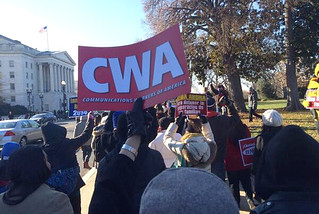
Activists march from the Capitol down to the Fast4Families tent on the National Mall.
Today CWA activists joined more than 1,500 immigration reform advocates in occupying over 200 congressional offices. Activists from across the country prayed and held vigils. The song "We Shall Overcome" echoed through the halls of Rayburn House Office Building.
It was a final send-off to lawmakers before they head back home for the holidays. And it was also a preview of the 2014 campaign to come, telling House Speaker John Boehner and House Republicans that this issue is not going away. The time for Congress to pass immigration reform with a path to citizenship is now.
The entire Democratic caucus stood behind reformers. They gathered for a press conference with Fast4Families participants on the steps of the U.S. Capitol before marching down to the Fast4Families Fasting Tent on the National Mall for a closing ceremony.
Today was the last day of the fast that started on Nov. 12 to spotlight our country's broken immigration system. Activists – including CWA President Larry Cohen, who joined the fast for 24 hours – helped spark a nationwide movement, which included more than 10,000 solidarity fasters from coast-to-coast and millions committing to act for reform.
TPP Trade Deal Misses 2013 Deadline, Talks Continue
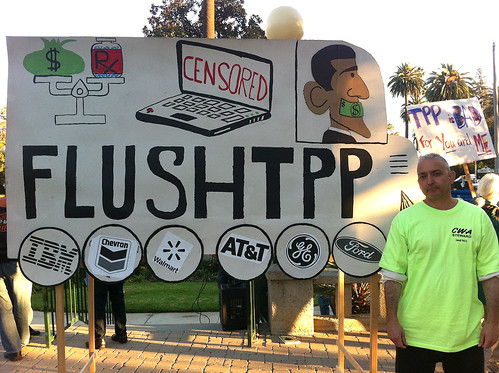
Ernie Pacheco, CWA District 9's environmental programs coordinator, rallies against the TPP at a Beverly Hills, Calif., protest.
Trans-Pacific Partnership negotiators missed their year-end deadline to complete the deal, giving activists more time to take down the massive, secretive agreement that could destroy workers' rights and jobs.
"We've been losing service sector jobs at the same pace now as manufacturing jobs," said CWA President Larry Cohen on a media call discussing the TPP. "Half a million call center jobs have gone overseas in the past five years. The 600 multinationals that are negotiating this deal are looking at net profits. We need to look at what would be the net results on jobs for workers – not just jobs created by exports but also those jobs lost to imports."
He added, "There's nothing in this for the American people."
Listen to the entire media call also featuring Reps. Rosa DeLauro and Louise Slaughter, Sierra Club Executive Director Michael Brune, Steelworkers President Leo Gerard and Teamsters President James Hoffa here.
And check out Cohen's discussion about the TPP with Ed Schultz on The Ed Show.
Opposition is growing.
This week The Huffington Post reported that the Obama administration "appears to have almost no international support for controversial new trade standards that would grant radical new political powers to corporations, increase the cost of prescription medications and restrict bank regulation." Read more here.
CWA activists continue to put pressure on lawmakers to vote no on "fast track," a process that would restrict Congress to an up-or-down vote on the TPP with no amendments. Most recently we joined with Citizens Trade Campaign, Moveon.org, Sierra Club and Trade Justice to protest Rep. Gregory Meeks's decision to join the Pro-TPP Caucus. Check out this video of the rally outside his New York office.
Tell the FCC: Keep Spectrum Auction Open to All
The Federal Communications Commission (FCC) is writing the rules for an incentive auction for wireless spectrum. Television and radio broadcasters and mobile devices all use spectrum for wireless communications, and all four national wireless carries – AT&T, Verizon, T-Mobile, and Sprint – need more spectrum to meet the explosion in traffic over wireless networks.
CWA and a growing number of lawmakers are weighing in to make sure that the auction is fair and open to all bidders. Read more and take action at http://www.dontrigtheauction.org/.
"In the incentive auction, I believe the FCC should let all interested participants freely compete against one another in the open market and should avoid putting its thumb on the scale, as we are apparently witnessing in connection with the Justice Department's settlement agreement in the American Airlines and US Airways merger," said Sen. John Thune (R-S.D.) during a Senate Commerce Committee hearing on Tuesday. "The value of using spectrum auctions is that the free market is more effective at allocating spectrum than relying on the subjective opinions and predictions of government officials. American consumers should pick who wins in the marketplace, not the government."
In a letter to FCC Chairman Tom Wheeler, Sen. Chuck Schumer (D-N.Y.) urged the agency to assure that the upcoming wireless spectrum auction would be open to all bidders, so that the government can maximize revenue and adequately fund the FirstNet emergency response network.
Schumer writes:
"... in structuring these auctions, to maximize participation by broadcasters and bidders alike by avoiding limitations that could lower the potential return and disincentivize broadcasters from offering their spectrum for auction. While I understand that some have advocated for rules that would limit participation by certain wireless carriers, the effect of such rules would simply be to reduce the amount of spectrum offered for auctions as well as the revenue that would be generated in return. Ultimately, then, the biggest loser would be FirstNet and the public safety network America needs to thrive in the 21st century."
Right now, a number of interests are lobbying the FCC to establish different rules for different bidders, potentially slowing the spread of wireless and the investment and jobs that go with it. T-Mobile US and Sprint are asking the FCC to limit how much spectrum their larger competition – AT&T and Verizon – can buy. CWA is pressing for an open, unbiased auction.
Read CWA President Larry Cohen's letter to the FCC, arguing for fair rules, here.
Solidarity with Amazon Workers in the U.S. and Germany
On Monday, Dec. 16, CWAers and other union activists will rally outside Amazon's worldwide headquarters in Seattle to show their solidarity with Amazon workers in Germany who are holding a rolling strike.
The Amazon Germany workers, members of ver.di, have been holding a series of rolling strikes to push the company to negotiate with ver.di. Currently, the Amazon workers aren't covered by the negotiated agreement for the retail and mail order trades industry. That means Amazon workers in Germany earn several thousand dollars a year less than other warehouse workers because Amazon arbitrarily sets its wage rate. The Amazon workers also have fewer benefits and a more hostile work environment.
Sometime over the Dec. 16-20 period, Amazon workers in Graben, Bavaria, will join the rolling strike; ver.di members in Bad Hersfeld and Leipzig also will be on strike.
There are about 9,000 permanent and approximately 6,000 to 10,000 non-permanent Amazon workers at eight locations in Germany. Working conditions are very stressful and workers face constant monitoring and supervision.
So far, Amazon has refused to negotiate with ver.di, but Frank Bsirske, the head of ver.di, said, "We are not going to let a big American company come here and play Wild West. This is a clash of cultures."
At Amazon headquarters in Seattle, ver.di Amazon workers will be joined by union members from Washington State, including activists from CWA, UFCW, SEIU, Teamsters and the AFL-CIO.
U.S. Senate Confirms Executive, Judicial Nominations
The U.S. Senate moved forward to confirm the nomination of Rep. Mel Watt as director of the Federal Housing Finance Agency, and confirmed Patricia Millett to the DC Circuit Court of Appeals. And following a Republican "talk-a-thon" last night, the Senate also moved forward on the confirmation of Cornelia "Nina" Pillard, also to the DC Circuit Court of Appeals.
Watt will be a strong advocate for individual homeowners and communities and will take on predatory lending and other financial practices that harm consumers. His confirmation was long overdue, delayed because the Senate minority was determined to pursue a partisan agenda and block his nomination from proceeding to a confirmation vote.
The confirmations of Watt, Millett and Pillard happened only because Senate Majority Leader Harry Reid and a majority of Democrats voted to end obstruction and gridlock on nominations by restoring majority vote confirmation for judicial and executive nominations, as called for by the U.S. Constitution. The Senate minority had been blocking action by requiring a 60-vote supermajority for all Senate business, even on the motion to adjourn.
The Senate has made similar changes to its rules 18 times over the past 35 years.
CWA commended Reid and the other champions of Senate rules reform. With the Fix the Senate Now coalition and the Democracy Initiative, we will work for more changes to the Senate rules in January 2015 to restore real debate and deliberation on legislation, as the U.S. Constitution charges the Senate to do.
T-Mobile Worker Survey Confirms Harassment, Bullying, Illegal Actions by Deutsche Telekom Subsidiary
At a news conference tomorrow in Bonn, Germany, ver.di, the union representing workers at Deutsche Telekom in Germany, CWA and UNI Global Union, will spotlight Deutsche Telekom's policy of allowing its subsidiaries outside Germany to intimidate and harass workers.
The unions will call on DT to use the change in top leadership that is coming at the end of this year as an opportunity to change course and end the "culture of bullying" that DT has allowed to take hold in the United States and other countries where T-Mobile operates.
The news conference will expose DT as a "Black Book Telecom" and cite its violations of the right to freedom of association, human rights and labor law outside of Germany. It also will release the results of a survey conducted among 1,800 workers from seven countries outside of the company headquarters in Germany, carried out by affiliates of UNI Global Union. The countries surveyed were Bosnia and Herzegovina, Croatia, the Czech Republic, Greece, Montenegro, Romania and the United States. All workers were employed in companies with either direct or indirect Deutsche Telekom ownership.
CWA President Larry Cohen will be in Bonn as DT's Supervisory Board prepares to name a new chairman. He outlined the campaign of humiliation, fear and illegal actions that T-Mobile US workers face:
"In 2001, CWA supported Deutsche Telekom's entrance into the U.S. market on the recommendation of ver.di which cited DT's respect for workers' rights. In fact, DT acknowledges the value of its relationship with ver.di and respects workers' rights in Germany.
"But in the U.S., DT USA management has no tolerance for workers who want to form a union. DT allows its subsidiary T-Mobile US to attack workers' rights and create an atmosphere of fear and intimidation in the workplace," Cohen said.
"ver.di has been a great partner in this effort to support the rights of T-Mobile workers, in the U.S. and in other countries. ver.di members have taken on the cause of Josh Coleman, a top performing worker who was illegally fired from T-Mobile US's Wichita, Kan., call center. Thousands of ver.di activists have protested this action and wear t-shirts that say 'We Are All Josh,'" Cohen said.
The U.S. government is prosecuting T-Mobile US for illegal firings and disciplinary action taken against union supporters. "This is the only beginning, as the number and intensity of U.S. labor law violations have grown," he said.
Lothar Schröder, a ver.di Federal Executive Board member, said, "The survey findings confirm our belief that Deutsche Telekom must do more to ensure fair conditions and respect for worker rights in its operations outside Germany. ver.di is committed to working together with UNI Global Union and the DT Union Alliance to press for the remedies set out in the report."
Among the key survey findings:
- Forty-six percent of T-Mobile workers have experienced bullying in the form of verbal aggression, denigration of professional abilities or demoralizing jokes.
- Workers in all survey countries (72% percent of the 1,800 respondents) said the best way for workers to improve their working conditions was through a union and a collective bargaining agreement.
- In nearly every country, a high proportion of surveyed workers said the employer exerts pressure to prevent employees from participating in the union or to undermine the effectiveness and reputation of the organization.
- Forty-nine percent of workers surveyed said they believe the company trains managers to discourage union activity, and 67 percent said that their employer says negative things about the union or its reputation.
"CWA will continue to work with ver.di and UNI Global Union until Deutsche Telekom accepts its responsibility for the way its subsidiaries in other countries treat workers," Cohen said.
Bargaining Update
The California Federation of Interpreters – a unit of the Pacific Media Workers Guild, CWA Local 39521 – have reached a tentative agreement with the courts in Region 2. The agreement includes a 2 percent pay raise starting October 2014, followed by a similar raise in 2015. Read more here.
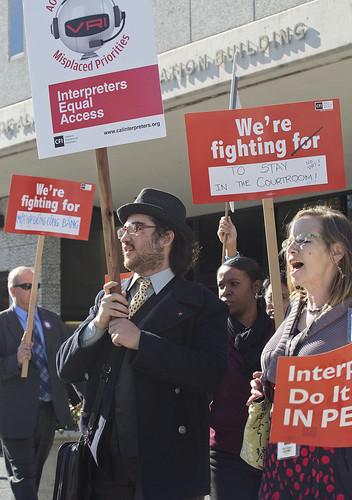
Court interpreters, members of the California Federation of Interpreters/Pacific Mediaworkers Guild/CWA demonstrate in front of the Oakland Superior Court for a fair contract, and to oppose proposals that they provide interpretation by video instead of in person.
Copyright David Bacon.
NLRB Issues New Complaints Against NBC
Region 2 of the National Labor Relations Board issued a new unfair labor practice complaint against NBC Universal this week over the issue of "content producers." The complaint cites NBC for its refusal to bargain, requires NBC to respond by Dec. 18 and has set a trial date in New York before an administrative law judge for Feb. 20, 2014.
NBC had created the job title of "content producer" five years ago and unilaterally changed the wages, benefits and working conditions for about 100 newswriters, editors, and photographers at owned-and- operated TV stations in New York City, Chicago, Los Angeles and Washington, D.C.
NABET-CWA charged that this move violated federal labor law and an NLRB regional director agreed in 2011. That decision was upheld by a three-member NLRB panel in September 2013, with NBC required to restore the wages, benefits and bargaining rights that these workers lost.
NABET-CWA called for immediate negotiations on behalf of the content producers, but NBC has refused to meet. NLRB Region 2 acted on a new unfair labor practice charge filed by NABET-CWA in late October.
These developments illustrate that the NLRB regions are functioning more fully since a five member Board was restored and a confirmed NLRB General Counsel was put into place.
"With a full NLRB in place overseeing regional activity, workers have a path to justice. This complaint was issued in just six weeks. We are confident that our members who had careers and lives disrupted by NBC's unlawful actions will soon get the justice that they deserve," said NABET-CWA President Jim Joyce.
Building Our Movement
Fight for $15
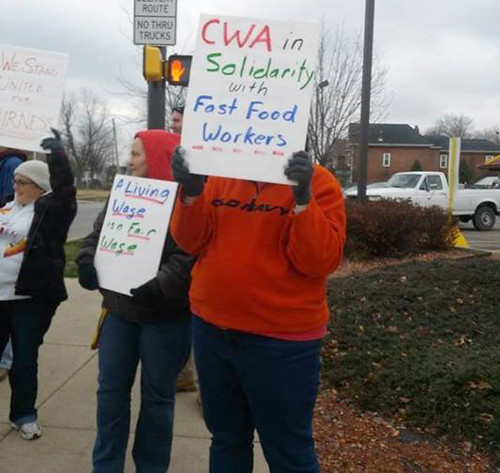
As fast-food workers walked off the job in more than 100 cities last week, CWA activists joined them on the frontlines.
Below, members of CWA Local 4900 join the protest in Fort Wayne, Ind.

Read about our Kansas City rally in the Kansas City Star.
Pride At Work
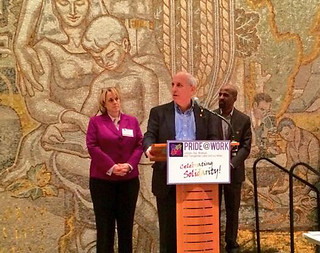
Pride at Work honored CWA for our work on LGBT workers' rights at its annual "Celebrating Solidarity" event.
CWA Heroes: Verizon Techs Stop Assault in Queens, NY
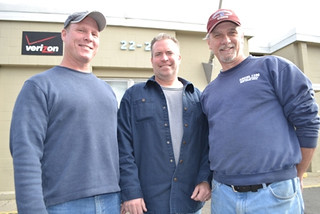
Members of CWA Local 1106 and Verizon technicians Michael Popowich, Anthony Howley and John Gilday.
Photo credit: Melissa Chan, Queens Courier, Queens, NY.
Three CWA Verizon workers, members of Local 1106, were working In Queens, N.Y., on Oct. 30. On the job, they saw a man push a woman to ground, start to pull off her clothes and assault her.
The three technicians chased the alleged assailant and wrestled him to the ground, holding him until police arrived.
In media interviews, the three talked about what happened.
"I'm not surprised by what we did. I think anybody who was in our situation would have done the same thing," Michael Popowich, a Verizon lineman.
"It was just natural instincts," said Anthony Howley, another Verizon lineman. "I didn't do it for any of the accolades or anything like that, it was just seeing a woman being attacked and we just stepped in to save her."
"We just reacted," John Gilday said. "I have daughters, a wife, sisters – I hope if something like that was happening to them, someone would do something about it. I don't want to see that happen to anybody."
December 10, 1948
In a piece in The Huffington Post, CWA President Larry Cohen reflected on the beginning of International Human Rights Day. He wrote:
Eleanor Roosevelt proclaimed International Human Rights Day, speaking mostly to the rest of the world emerging from war and facing human rights issues on every continent. At that moment, the U.S. led the world's democracies by almost every measure. Now 65 years later, the blocks to our democracy are as glaring in the U.S. as anywhere else.
Sixty-five years ago, workers' rights in the U.S. matched any other nation. Collective bargaining was on the rise with more than one in three U.S. private sector workers covered by agreements with their employers, providing a voice on the job and a rising standard of living. Today only 1 in 15 workers has those same rights and the standard of living has stagnated for 40 years. In 1948, the new federal minimum wage actually provided a path to a livable wage; today, the federal minimum wage provides virtually nothing but an excuse for employers to say they are following the law.
Just as importantly, in 1948, our civil rights movement was emerging as a major force, just as independence movements were building across Africa and Asia after a century of colonization. Over the next 20 years, Jim Crow was dismantled from the schools to the buses to the voting booths.
But since then, our judiciary has extended unlimited free speech rights to corporations from the workplace to electoral politics -- first ruling that corporate free speech meant the unlimited right to campaign against collective bargaining and eventually deciding that money equals speech, so there could be no limits on money in politics, for corporations or individuals.
So despite significant gains in the rest of the world from South Africa to Brazil, India to Argentina, democracy in the U.S. is collapsing, compared to our 21st century counterparts. Collective bargaining is a shell of its past, and real wages are falling in all industries. While most democracies now have near universal voter registration, voter suppression measures passed by most states result in about 71 percent of U.S. citizens registered to vote, roughly the same as in years before the Voting Rights Act. Nearly $7 billion was spent in the 2012 congressional and presidential elections. While Senate rules on nominations moved forward in the past few weeks, thanks to an unprecedented coalition, more of this president's nominations are blocked than any other administration over the past 200 years.
One year ago we helped launch the Democracy Initiative, a massive coalition of organizations with more than 20 million members from civil rights, environment, community, faith, consumer, student and labor groups. As noted, we have already made a difference on Senate rules and confirmation of key consumer, labor and judicial nominations. We also work together on voting rights and getting big money out of politics, working mostly at the state level. The endorsing organizations will meet early in January to gear up for the coming year.
But as we celebrate International Human Rights Day this December 10, we need to realize how far we must go compared to the promise of 1948. We need to build this movement to create the 21st century democracy that provides comparable rights for our citizens in the increasingly global economy.
US Airways-American Airlines Merger Creates World's Largest Airline
The US Airways-American Airlines merger is official. The merged carrier will create a stronger, more competitive airline that will provide better service and more options to passengers than either airline can do alone. That means quality jobs and opportunity for the airlines' 70,000 front-line employees and expanded service for passengers.